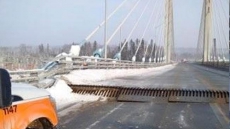OTTAWA — The premier of the Northwest Territories doesn't see climate change as a ticking time bomb — in his part of the country, it's already gone off.
Canada's North is at the forefront of climate change and its effects can be seen with the naked eye on a daily basis, Bob McLeod said in an interview with The Canadian Press.
Warmer temperatures have led to a host of changes, including a shifting tree line, problems with the territory's winter road network and significant impacts on the caribou population, McLeod said.
"I could go on and on," he said. "We have permafrost ... that's melting. It is affecting our buildings and our housing so we have to change our building techniques."
Climate change has also contributed to the disappearance of certain fish species, McLeod noted. "We are seeing wildlife species foreign to this area ... moving further north from the south like cougar and whitetail deer."
He also suggested the territory is at the mercy of outside efforts to reduce greenhouse gas emissions.
"We are doing our part, but I mean, in the larger scheme of things, we are very small emitters of CO2 (carbon dioxide) gases," McLeod said.
"Obviously we are dependent on national and international actions to reduce the overall emissions of greenhouses gases."
McLeod said he looks forward to participating in upcoming discussions with the federal government as it prepares to hammer out a national climate change strategy along with the provinces and other territories.
"From all accounts, the prime minister has indicated that the government of Canada is going to take a much more active leadership role working ... closely with the provinces and territories, so I was heartened by that," he said.
"I was also heartened by the fact that Canada contributed significantly to help developing countries to deal with climate change. We are hopeful he will take the same approach with developing territories to help us deal with the effects of greenhouse gases that are largely not our own doing."
The annual average temperature has increased 1.6 degrees C, or twice the global average, since 1948, according to briefing documents prepared for Prime Minister Justin Trudeau.
Canada's North has warmed by about three times the global average — a boost of 2.2 C, the documents note.
"I remember 20 years ago, I had the opportunity to make a presentation to a Senate committee on climate change," McLeod said. "I look back to some of things I talked about. Most of it has come true."
McLeod recalled a senator asking if he would be happy to see warmer temperatures in the North.
"I said 'No, the reason we live up here is because we like the cold weather and we like our four seasons," he said.
"So it is unnerving to ... have temperatures in the single digits in January ... you wonder what the world is coming to."



